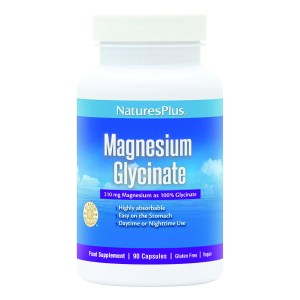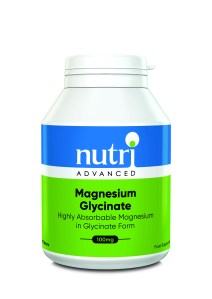Experiencing poor sleep, muscles aches or heightened anxiety? You might be deficient in magnesium. Shona Wilkinson, lead nutritionist at Dr.Vegan, explains how this vital mineral can help.
Magnesium is our very own mineral superhero. It is involved in over 300 essential cellular reactions in the body and plays a key role in maintaining our energy levels, keeping our bones and muscles healthy, supporting our brain, and helping us fight off illness. Perhaps most importantly, magnesium is an essential component in protein synthesis, meaning it supports the continual cell division our body needs to protect itself from diseases like cancer.
Meet the expert
Shona Wilkinson is a registered nutritionist and member of the British Association for Nutrition and Lifestyle Medicine and the Complementary and Natural Healthcare Council. She has more than 20 years’ experience in the field of nutrition, and works closely with the ethical supplement and nutrition brand Dr.Vegan to deliver its award-winning, plant-based supplements. For more information, visit drvegan.com
Dealing with deficiency
The recommended dietary allowance, or RDA, for women aged 19-51 is 310-320mg, though pregnant women need slightly more. That being said, one-in-eight of us in the UK are deficient in magnesium, including a quarter of all teenage girls.
Low magnesium levels are often caused by a combination of not getting enough of the mineral through your diet and a wide range of other factors. Most relevant to the everyday athletes among us is the amount we exercise, with research suggesting that this can increase the amount of magnesium we lose through sweat by 10-20 per cent. This is why it’s incredibly important to ensure your diet is filled with food that’s going to keep you topped up with all the essential vitamins and minerals you need after exercise, rather than prioritising protein alone.
The level of magnesium in our body is also affected by our menstrual cycle, generally reaching its highest during menstruation and lowest during ovulation. In addition to this, prolonged stress, the over-consumption of coffee, salt and alcohol, and other conditions such as IBS, can all lead to magnesium deficiency.
Spot the signs
Given the vital role magnesium plays in our bodies, it’s unsurprising that there are a number of symptoms associated with a deficiency, ranging from mild to serious. These include:
- Magnesium helps our muscles to relax. As such, a deficiency can cause them to contract too much, leading to regular twitches or cramps.
- Magnesium helps to regulate our ‘sleep hormone’, melatonin, meaning a deficiency can lead to poor sleep quality or even insomnia.
- In addition to our muscles, magnesium plays a key role in regulating our nerve impulses – crucially, this includes those associated with maintaining a normal heartbeat. As such, a deficiency can lead to an irregular rhythm or regular heart palpitations.
- Numbness, tingling, or a persistent feeling of pins and needles can often occur as a result of a magnesium deficiency, mainly due to the important role the mineral plays in nerve functions around our body.
- As a result of its role in helping to increase bone mineral density, studies show that a magnesium deficiency may contribute to osteoporosis, a condition that weakens our bones and makes us more prone to fractures.
- Given the relationship between magnesium and brain function, there are studies to suggest that a deficiency can lead to anxiety, depression and mood-swings. If you are struggling with any of these symptoms in particular, please consult a medical professional.
Foods to focus on
Leafy greens like spinach and chard are among the best sources of magnesium available, with each containing around 80mg of these are incredibly easy to add into dishes throughout the day and can make a huge difference to your wellbeing, given they’re packed with a whole host of vital nutrients.
Almonds, cashews and peanuts are an ideal snack for those on-the-go, and they’re packed with the mineral. A 30g handful of almonds contains around 80mg of magnesium, with cashew nuts packing a similar punch. You can make a huge dent in your required daily dose with the help of a trail mix. Other foods such as fish, avocados, bananas and dark chocolate are all high in magnesium, too, and can go a long way in keeping you topped up throughout the day.
Ultimately, if you split your required 310mg over the course of an entire day, sneaking magnesium-rich foods into your breakfast, lunch and dinner, you can quite comfortably hit your daily RDA without noticing a huge difference in your diet.
Top up your levels
Of course, maintaining a healthy diet filled with all the vitamins and minerals you need to keep yourself fit and healthy all year round is often easier said than done. For those among us often grabbing food on-the-go, it’s sometimes useful to keep ourselves topped up with the help of supplements.
When choosing a magnesium supplement, it’s important to choose the right one. There are eight different forms of magnesium, with magnesium citrate and magnesium glycinate among the most bioavailable and compatible with our bodies. You should also look for a supplement that provides an optimal dosage without containing any of the nasty additives or hidden ingredients often found in many of today’s supplements. Remember to always check the label of the supplements you’re using so you know exactly what you’re putting into your body.
Ultimately, it’s vital to listen to what your body is showing you, especially at this time of year. Ensuring your body is topped up with all the magnesium it needs is a great way of taking care of your muscles, bones and brain. Whether it’s through your diet or through the use of a supplement, make sure you get as much of this mineral superhero as needed to keep yourself firing on all cylinders this winter.
5 of the best magnesium supplements to try
 Dr.Vegan Magnesium Citrate (£8.99, drvegan.com) contains 200mg of elemental magnesium in a highly bioavailable form. It’s also free from animal ingredients and nasty additives, plus the packaging is plastic-free and home compostable.
Dr.Vegan Magnesium Citrate (£8.99, drvegan.com) contains 200mg of elemental magnesium in a highly bioavailable form. It’s also free from animal ingredients and nasty additives, plus the packaging is plastic-free and home compostable.
 Wild Nutrition Food Grown Magnesium (£19.50, wildnutrition.com) is grown in raw, live food paste, meaning the full biochemistry of the mineral is represented and your body recognises and absorbs it just like food.
Wild Nutrition Food Grown Magnesium (£19.50, wildnutrition.com) is grown in raw, live food paste, meaning the full biochemistry of the mineral is represented and your body recognises and absorbs it just like food.
 NaturesPlus Magnesium Glycinate (£17.95, amazon.co.uk) provides 210mg of magnesium in a highly bioavailable bisglycinate form which also supplies glycine, an amino acid that works alongside magnesium to ease symptoms.
NaturesPlus Magnesium Glycinate (£17.95, amazon.co.uk) provides 210mg of magnesium in a highly bioavailable bisglycinate form which also supplies glycine, an amino acid that works alongside magnesium to ease symptoms.
 Inessa Magnesium (£24.99, inessawellness.com) features three types of magnesium – all selected for their superior bioavailability – including magnesium bisglycinate, magnesium threonate and marine magnesium from purified seawater.
Inessa Magnesium (£24.99, inessawellness.com) features three types of magnesium – all selected for their superior bioavailability – including magnesium bisglycinate, magnesium threonate and marine magnesium from purified seawater.
 NutriAdvanced Magnesium Glycinate Tablets (£17.56, nutriadvanced.co.uk) provides 100mg elemental magnesium per tablet in a highly absorbable glycinate form, with added glycine enhancing the calming effects.
NutriAdvanced Magnesium Glycinate Tablets (£17.56, nutriadvanced.co.uk) provides 100mg elemental magnesium per tablet in a highly absorbable glycinate form, with added glycine enhancing the calming effects.









